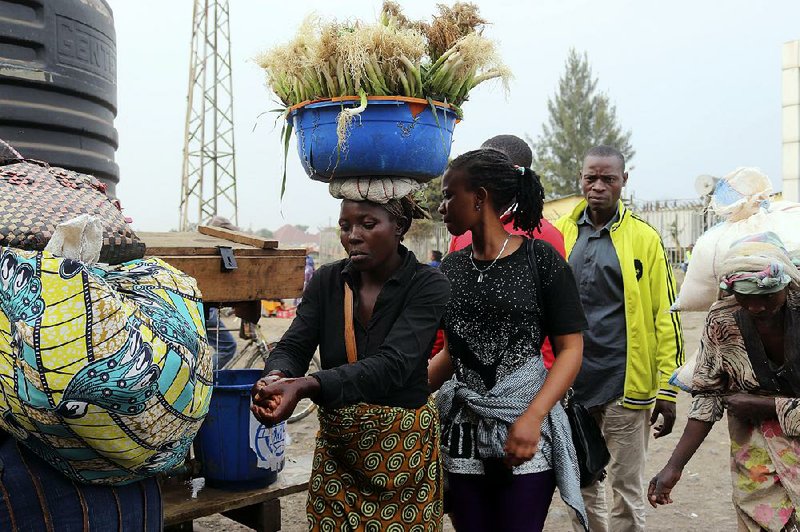KINSHASA, Congo -- The 1-year-old daughter and the wife of the man who died of Ebola in Congo's city of Goma this week have tested positive for the disease, health officials confirmed Thursday, while Rwanda briefly closed its border with Congo over the virus outbreak that now enters its second year.
It is the first transmission of Ebola inside Goma, a city of more than 2 million people on the Rwandan border, a scenario that health experts have long feared. The painstaking work of finding, tracking and vaccinating people who had contact with the man -- and the contacts of those contacts -- has begun.
The man died Wednesday after spending several days at home with his large family while showing symptoms. Congo's presidency said the entire family was at "high risk" and in quarantine. The Ebola coordinator for North Kivu province, Dr. Aruna Abedi, confirmed the wife's case hours after that of the child.
"We're seeing the first active transmission chain in Goma and expect more to come," the International Rescue Committee's Ebola response director, Andre Heller, warned in a statement.
This outbreak has killed more than 1,800 people, nearly a third of them children. It is now the second-deadliest Ebola outbreak in history, and last month the World Health Organization declared it a rare global emergency.
Rwanda's state minister for foreign affairs Olivier Nduhungirehe confirmed the border closure, a day after WHO officials praised African nations for keeping their borders open. Last week Saudi Arabia stopped issuing visas to people from Congo while citing the Ebola outbreak, shortly before the annual hajj pilgrimage there this month.
Congo's presidency condemned Rwanda's decision, and Congolese at the busy border expressed frustration. "I can't understand why they don't just test us instead of closing these borders," said Angel Murhula, who works in Rwanda.
Several hours later Congo's presidency said the border had reopened. A Rwanda health ministry statement called the events a "traffic slowdown" as surveillance for Ebola was reinforced. The ministry advised against unnecessary travel to the Goma area.
WHO has recommended against travel restrictions amid the outbreak but says the risk of regional spread is "very high."
Any border closure is likely to push people to avoid formal immigration posts.
The death on Wednesday in Goma "in such a dense population center underscores the very real risk of further disease transmission, perhaps beyond the country's borders," United Nations agencies said in a joint statement marking a year of the outbreak.
The man in his 40s was a miner returning from an area of northeastern Ituri province, Mongwalu, where no Ebola cases in this outbreak have been recorded, WHO said. He was exposed to the virus along the roughly 300-mile-long route from Komanda to Goma as he took motor taxis over a number of days through the densely populated region at the heart of the outbreak.
The man arrived in Goma on July 13 and started showing symptoms on July 22. He was isolated at an Ebola treatment center on Tuesday. He had spent five days being treated at home and then went to a health facility, where Ebola was suspected. Symptoms can start to occur between two and 21 days from infection, health experts say.
Congo's new Ebola response coordinator, Jean-Jacques Muyembe, has said there appears to be no link between the case and the previous one in Goma that was announced 2½ weeks ago. That case was a 46-year-old preacher who managed to pass through three health checkpoints on the way from Butembo, one of the communities hardest hit by this outbreak.
The declaration of a global health emergency -- the fifth in history -- came days after that first Goma case. It has brought a surge of millions of dollars in new pledges by international donors, but some health workers say a new approach is needed to combat misunderstandings in a part of Congo that had never experienced Ebola before.
Information for this article was contributed by Al-Hadji Kudra Maliro of The Associated Press.
A Section on 08/02/2019
